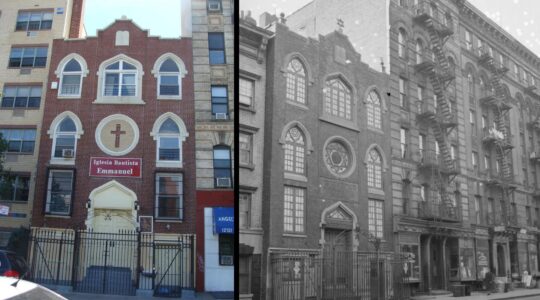That quest for enlightenment is a bit what it’s like interviewing the Coens. A brigade of publicists courts you weeks in advance, each new e-mail enticing you for the next: the first one promises you the interview;
the second that the interview will be in person. In subsequent e-mails you learn the day, time, place, and finally receive one last note: arrive early, you have only 15 minutes.
When all is said and done, what do you get? To quote Larry’s brother in one of the film’s more touching scenes: “bupkis.”
OK, maybe not nothing, but certainly not the answers you were looking for. The Coens are infamous for avoiding discussions about the deeper meanings of their films. But each work — there are now 14, several of them Oscar winners — begs some questions. In the film the rabbis — from an uninformed junior rabbi to a bearded sage-type spiritual leader — all come up short for Larry, though answers do seem suggested elsewhere in the script.
There is, for instance, the theme song, “Somebody to Love” by Jefferson Airplane, which sets the mood of the time and place: 1967, suburban Minnesota. Or perhaps clues come from the father of one of Larry’s students who is failing class. The father threatens to blackmail Larry if his son doesn’t pass, ending his scene with the Delphic, “Accept the mystery.”
When asked if those lines were their way of answering the thorny philosophical question the film poses, Ethan quipped: “Those lines must have just slipped into the rewrite.”
Ethan, 52, the younger brother, tends to give short, biting answers that are apiece with his macabre, ironic temperament: Decades ago, when he was studying philosophy at Princeton, he took a year off without telling his dean. Upon his return, he wrote a letter to the school explaining that he had shot off his left arm in a hunting accident in a relative’s living room.
It was, of course, a hoax, as is the man who gets credit for editing most Coen films, Roderick Jaynes. Jaynes was nominated for an Oscar for “Fargo,” until Variety reported that the Coens made him up. (Jaynes gets editing credits again for “A Serious Man.”)
But if snickering humor is part of the Coen brothers’ mystique, the brothers are not unhinged provocateurs. At least not in person. “It wasn’t as if we were suggesting our spiritual leaders can’t give us answers; for some people they may,” said Joel, 54, the calm, reasoning older brother.
The film suggests that Judaism has no better answers to life’s most vexing questions than does, say, a 1960s rock band. In one scene the second rabbi, Rabbi Nachtner, tells Larry about a Jewish dentist who came to him asking similar questions — what does it all mean? The dentist was deeply troubled by Hebrew letters he discovered inscribed on the teeth of a patient, who was Christian. “Is it a sign from Hashem?” the rabbi quotes the dentist.
But when Larry asks if they ever found out why the patient had Hebrew letters in his mouth, or what it all might mean, the rabbi says that we’ll never know the answer to these things. God’s reasons are unknowable to us. “It sounds like you don’t know anything,” Larry says back at him, exasperated.
Ethan downplays the religious implications of the film. “We were really just looking for a good story,” he said, pacing the room while his brother sat patiently, filling in answers when necessary. The brothers said that they only recently decided to make a film inspired by their own autobiographies, though Jews, Minnesota, and God — three defining nouns in their lives — have popped up in various other works.
Two of the best-known Coen characters are Barton Fink, from the film of the same title, in which John Turturro plays a Jewish director in 1940s Hollywood. The other is Walter Sobchak, the Jewish Vietnam vet played by John Goodman in “The Big Lebowski” — famous for refusing to bowl on Shabbos. “Fargo” was the Coens’ first homage (albeit a biting one) to Minnesota, and in 2008 Ethan premiered a short play Off Broadway about two gods squaring off in a debate.
“A Serious Man” is the most personal Coen film to date, however. The brothers grew up in St. Louis Park, Minn., a heavily Jewish city near Minneapolis that is also the hometown of comedian and now Minnesota Sen. Al Franken and of New York Times columnist Thomas Friedman. Like the character Larry Gopnik, both Coen parents were professors — their father an economist, their mother an art historian. And of course, all were nominally observant Jews.
But the story itself — really a modern-day Book of Job — was pure fiction. “Nothing like what happened to Larry ever happened to our parents,” said Joel. They said that they have not asked their rabbis the kinds of spiritual questions Larry asks his rabbi. And, for Ethan at least, the rabbinical conceit came about because it sounded like a good joke: “A guy goes to three rabbis … that could be hilarious!” Ethan said.
The success of the Coen brothers has enabled them to use Hollywood’s biggest stars for recent films. Brad Pitt and George Clooney both starred in their last film “Burn After Reading,” following the Oscar success of “No Country for Old Men,” which won Academy Awards for both best picture and director.
But “A Serious Man” was shot on an anemic budget that necessitated lower-profile actors. In a way, though, the tight budget works in tandem with an original casting goal: to get real Jews to play Jewish characters. For many roles, the Coens held local tryouts in Minnesota, even going to synagogues and Hebrew schools searching for talent. “We wanted to cast real Jews as opposed to the Hollywood ethnic type,” Ethan has said. “They are Jews on the plains — that’s what we wanted to get across.”
For the lead they cast Michael Stuhlbarg, a Julliard-trained actor well known for his Broadway roles. He received a Tony nomination for his 2005 performance in Martin McDonagh’s “The Pillowman,” and played the lead in “Hamlet” at the Public Theater’s Shakespeare in the Park series last summer.
In an interview, Stuhlbarg explained how his background helped him with his role. Hamlet and Larry both “find themselves in tough circumstances,” he said, but perhaps more important: “My first play was at the JCC.” As a teenager, he starred in “Bye, Bye Birdie” at his local community center in Long Beach, Calif., where he grew up.
For the Coen film, Stuhlbarg originally auditioned for a character in the opening scene — a short dybbuk parable spoken entirely in Yiddish. (Fyvush Finkel plays the dybbuk.) He didn’t get the part, but the Coens called him back asking him to try out for Larry and his brother, Arthur. Stuhlbarg was on a theater retreat in Vermont when Joel called again and said, “I’ll put you out of your misery; you’re playing Larry.”
“A huge smile came over my face,” Stuhlbarg said.
Though the Coens are famous for their attention to detail, at least two pieces are noticeably absent in their presentation of Jewish life: no Israel, and no Holocaust. They said that Israel was in fact hotly discussed in the Coen household growing up, and that an earlier scene with an Israel reference got cut in the final draft. (The film takes place in 1967, the year of the Six-Day War.) “But the story became something else,” Coen said, noting that it was because of narrative concerns, not politics, that the Israel references were cut.
Likewise for the Holocaust: “We had parents’ friends who were Poles, Jewish survivors,” Ethan said, “but as a kid it’s not something you really considered.” And a good portion of the film is told through the eyes of Larry’s teenage son, Danny, who is on the eve of his bar mitzvah.
Still other details often seen in the film are true to life. As Joel noted, “We did watch a lot of ‘F Troop.’”
The New York Jewish Week brings you the stories behind the headlines, keeping you connected to Jewish life in New York. Help sustain the reporting you trust by donating today.




